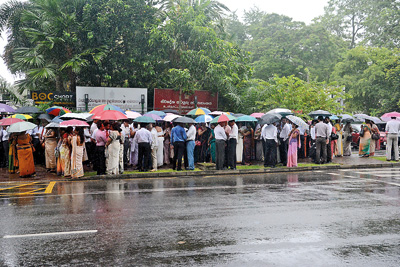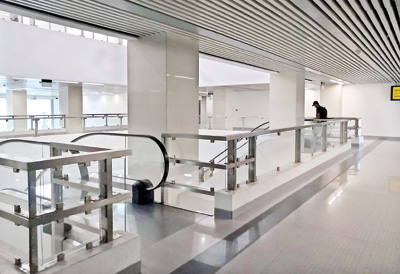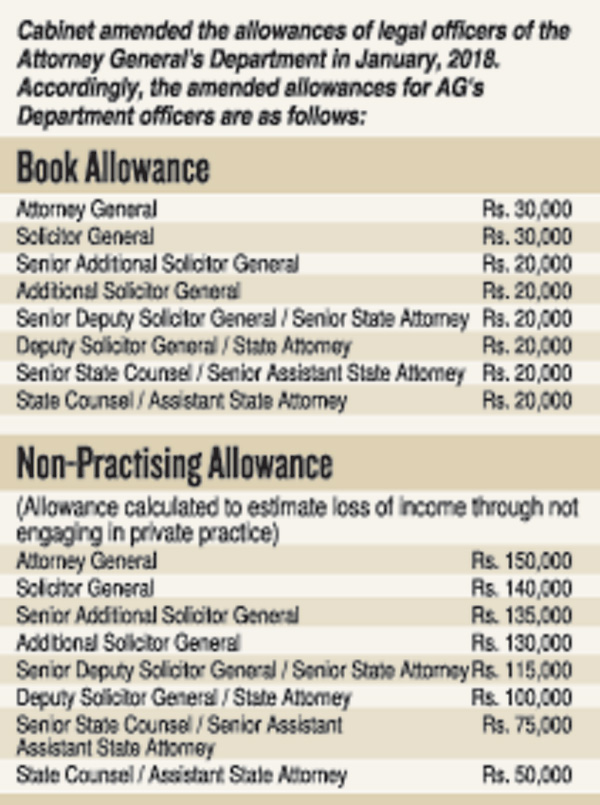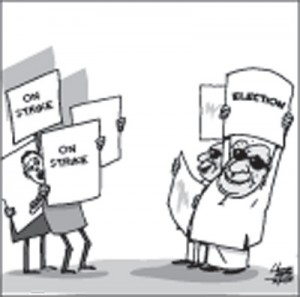News
SLASA vows to cripple state services again, if news is no good on Tuesday
The state administrative officers’ sick note campaign that crippled services at many key institutions threatens to morph into a full-blown indefinite strike from next week, if the Government and union leaders fail to work out a solution.

SLASA staged a two-day sick note campaign on Tuesday and Wednesday in front of the Public Administration Ministry. Pic by Isuru Perera
The 2,400-strong Sri Lanka Administrative Service Association (SLASA) staged a two-day sick note campaign on Tuesday and Wednesday demanding an end to political interference in their official work, the strict implementation of established criteria on recruitment, transfers and promotions and a resolution of the long-standing salary anomaly issue.
SLASA Secretary Rohana de Silva told the Sunday Times they believed the success of their union action sent a strong message to the Government.
He said political interference was becoming more prevalent as elections got closer. He cited as an example the recent transfer of the Social Services Department’ acting director.
“The transfer was made overruling the objections from other officers. If the transfer was on disciplinary grounds, there should have been a proper inquiry. Yet, no inquiry was held,” Mr de Silva charged.
“Politicians also tend to publicly level baseless accusations against our officers as elections draw closer. Such statements are made to unduly influence their conduct. We want this to be stopped,” he said, adding that recruitment, transfers and promotions should be done based on established criteria and not because “someone is known to this or that minister.”
The third demand, regarding the salary anomaly, now rests with the Cabinet. The SLASA Secretary said that at a meeting held with Public Administration Ministry Secretary J.J. Rathnasiri this week, they were informed that the report compiled by the Cabinet Sub Committee that looked into their salary anomaly issue would be presented to the Cabinet on Tuesday September 17. “They have been sitting on that report for a year. It is only after we initiated trade union action that they decided to present the report. Our next course of action will depend on the content of that report and what the Cabinet intends to do about it,” he warned.

The otherwise bustling Department of Immigration and Emigration was deserted as a result of the 2 day strike, and (right) security guards are seen turning people away at the Dept. Pix by Sameera Weerasekera
The SLASA will convene a meeting of its executive committee on Tuesday to discuss the situation while a meeting of the association’s district representatives will also be held later in the day. “We will decide then whether further union action is required. We may resort to an indefinite strike if we aren’t satisfied with the Government’s response,” the union secretary warned.
Although state institutions began functioning as normal from Thursday, they remained partially paralysed during the two-day sick-note campaign.

The Department of Registration of Persons issues about 1500 National Identity Cards (NICs) through its one-day service on average. The one-day service did not function during the two days that the SLAS officers conducted their trade union action, Commissioner General Viyani Gunathilake told the Sunday Times. “With Friday being a public holiday, we expect many of those who could not get their NICs to turn up early next week. We are prepared for this influx,” Mr Gunathilake stated.
The issuing of passports under both normal and one-day services at the Department of Immigration and Emigration were impacted during the two-day work stoppage, Assistant Controller (Legal) and Media Spokesman Gayan Milinda acknowledged. As such, far more people visited the Department once services resumed on Thursday, he said, but added that officials were able to handle the situation.
Motor Traffic Commissioner General Jagath Chandrasiri said work had returned to normal at his department.
Work at many District and Divisional Secretariats were also hampered this week by the trade union action, with district and divisional secretaries staying away from work.
The trade union action caused a revenue loss to the state, but SLASA Secretary de Silva declined to give an estimate, but said the revenue would still come to the State as the people inconvenienced by the trade union action would soon return to obtain the services.
“However, there will definitely be a loss to the State, but we were compelled to launch our campaign after the Government ignored our earlier appeals. As such, it is the Government’s responsibility.”
A senior Treasury official who spoke on grounds of anonymity said it would be difficult for the Government to accede to the SLASA’s demand with regard to the salary anomalies as the issue stemmed from the Government’s decision to raise the allowances of officers at the Attorney General’s Department. The official said the SLAS officers’ insistence that their salaries should be raised to match those of the AG’s Department was unfair because SLAS officers receive many additional perks.
“A divisional secretary, for example, has an office and quarters. A district secretary has a bungalow and its water and electricity bills are paid by the taxpayer. Even junior SLAS officers get quarters. They get fuel, travel and phone allowances. These and other allowances get added to their basic salaries. They get vehicle permits from the State and scholarships abroad that are funded by the State. Some SLAS officers get about Rs. 100,000 in allowances alone,” the Treasury official explained.
Moreover, if the salaries of SLAS officers are raised to match the AG’s Department, it in turn would create salary anomalies in as many as 12 other state services, the official warned. “This will bankrupt the state. We have seen such situations before elections. Various unions will push the Government to achieve maximum benefits for themselves during election times but the cost will be enormous,” the official added.
Mr de Silva of SLASA, though, insisted that the perks given to SLAS officers were not across the board. “Some officers who perform a specialised service will get a particular allowance in view of that. It doesn’t mean all SLAS officers get the same allowance,” he said, adding that their fight was to rectify the salary anomaly of their basic salary and the general allowances given to all officers.




